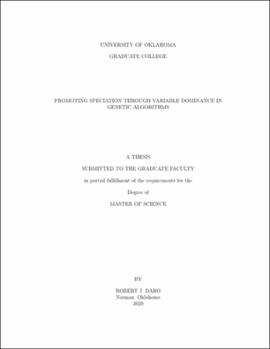| dc.contributor.advisor | Hougen, Dean | |
| dc.contributor.author | Daro, Robert | |
| dc.date.accessioned | 2020-05-19T18:29:12Z | |
| dc.date.available | 2020-05-19T18:29:12Z | |
| dc.date.issued | 2020-05 | |
| dc.identifier.uri | https://hdl.handle.net/11244/324424 | |
| dc.description.abstract | Genetic algorithms are a class of search algorithms that have been around since the 1970s. Despite their age, genetic algorithms still see a great deal of use in various applications and so many efforts have gone into addressing some of their limitations. Chief among the genetic algorithm's limitations is its tendency to converge to singular answers even when working with problem spaces that feature multiple optima. Furthermore, genetic algorithms will often converge to answers that are only local optima and not globally optimum. To that end, various researchers have developed methods to both encourage exploration of a problem space as well as promote diversification of genes to avoid global convergence. The most promising method is speciation, a term and concept borrowed from biology. New research shows that genetic structures using diploid chromosome models, meiotic inheritance, and gene dominance encourage speciation without the need for expensive selection modifications. Current implementations of dominance are hypothesized to skew exploration of search spaces. This work modifies the diploid approach to encourage exploration more generally by allowing dominance to evolve alongside the genes affecting the phenotype of the chromosome. These changes encourage speciation by allowing more symmetric exploration of the search space. While the modifications are not perfect, they serve as an excellent proof of concept for future work. | en_US |
| dc.language | en_US | en_US |
| dc.rights | Attribution-ShareAlike 4.0 International | * |
| dc.rights.uri | https://creativecommons.org/licenses/by-sa/4.0/ | * |
| dc.subject | Genetic Algorithms | en_US |
| dc.subject | Speciation | en_US |
| dc.subject | Artificial Intelligence | en_US |
| dc.subject | Machine Learning | en_US |
| dc.title | Promoting Speciation Through Variable Dominance in Genetic Algorithms | en_US |
| dc.contributor.committeeMember | Fagg, Andrew H. | |
| dc.contributor.committeeMember | Schlupp, Ingo | |
| dc.date.manuscript | 2020-05-08 | |
| dc.thesis.degree | Master of Science | en_US |
| ou.group | Gallogly College of Engineering::School of Computer Science | en_US |

